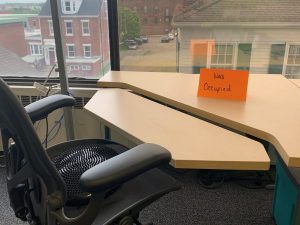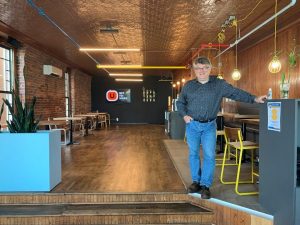SAINT JOHN — When New Brunswick implemented its state of emergency back in March, ConnexionWorks in Saint John, a co-working space meant to bring people together, had to figure out quickly how to keep people safely apart.
“Instantly there was a flip. We had to take control of how we were doing things and how we are going to do things moving forward without losing that community feeling,” ConnexionWorks co-founder Heather Acker. “It’s been a little bit of a challenge, but we’ve been able to overcome a lot of the issues.”
Located in Brunswick Square office tower in uptown Saint John, the 17,000 square foot space was able to physical distancing easily. Like most other professional and commercial spaces, signage was put up, cleaning was increased, and other measures were put in place to ensure client safety. But even then, they had to close its doors for some members.
“We did not close our doors completely. We immediately put in certain rules,” says Doug Jenkins, one of ConnexionWork’s other co-founders. “We allowed members with full-time membership because they had equipment here and computers here. But the number of people that did that was very small.”
“Instantly there was a flip. We had to take control of how we were doing things and how we are going to do things moving forward without losing that community feeling,” ConnexionWorks co-founder Heather Acker. “It’s been a little bit of a challenge, but we’ve been able to overcome a lot of the issues.”

“We have a slow increase in the number of people coming back. We have a very large space so we have no issues right now maintaining the six feet. But we hope to see more coming back.”
ConnexionWorks’ situation isn’t unique. Just a few blocks down on Prince William Street, USTATION has also faced similar challenges.
USTATION is a membership-based company that’s creating a network of inspiring, tech-enabled spaces and technologies to help people boost their productivity. They don’t market themselves as a co-working space per se, but members do come to their Prince William Street location to work.
Like ConnexionWorks, USTATION immediately went to members-only. They rearranged work stations to accommodate physical distancing, upped commercial cleaning and put hand sanitizer at every work station. They also had to stop their public tours and boardroom rentals to non-members.
“We shut down the tours which, from an impact perspective, is how we gain new members,” says USTATION co-owner Glen Hicks. “We shut down any non-member access to rooms and guests. It was really members only. We had strict rules of less than five people in the facility in the entirety.”
Today, that number has increased to 10. Members can log into their USTATION app to see exactly how many people are already there before they go in. They are slowly allowing guests to return, also using technology to do that safely.
“We’re starting to allow guests again, but we’re putting in technology to know which guests are here and there’s social tracking if necessary if there was an incident,” says Hicks.

Though USTATION offers various levels of membership, Hicks says they have had some users downgrade or cancel over the last few months. But the company was uniquely positioned in the sense that it wasn’t primarily the space that they offered. USTATION also offers its platform and technology to help people work from anywhere, not just their space.
USTATION introduced some new services, including consultation on how to work remotely and their own conferencing technology, which was used recently for Saint John Energy’s virtual AGM.
“We did that based on our technology and based on our knowledge, background and experience and there will be others we’ll be doing that for,” says Hicks “We’ve always been a work-from-anywhere company. That’s what we’ve always been about, that’s how we got started because the partners are work-from-anywhere people and we like that culture so that’s what we built this model.”
Hicks says though they didn’t get off scot-free, Covid-19 did make them focus more on developing that part of the business.
“It allowed us to lean into that model, so we’re offering more and more. We’re going to be offering USTATION Anywhere services,” he says.
“We’ve offered people who don’t know what to get for video conferencing, we’re allowing them to rent ours from their home, different products for how to manage in a remote environment. We’ve been stepping into those services and starting to offer those services.”
Co-working spaces could benefit in the long-run
Though co-working spaces have taken a hit during the Covid-19 crisis, they could see an increase in business in the long-term.
One of the big things Covid-19 has done is to change the way people work. With many people being forced to work from their homes, a lot of companies are realizing that an expensive office isn’t necessarily needed to be productive.
Employees are also seeing the benefits of working remotely, but are realizing the working only from home for long periods of time can bring its own set of issues. There is still the social and some structural elements that are missing that many workers need to be happy and productive.
This where coworking spaces come in.
“People want more flexibility to work at home when they want to and they also found that they need some socialization and they need other support structures that an office setting can provide them,” says Hicks. “You have a new demand more for this desire to be able to work where I want to work. And you have companies that are very cost-sensitive now, especially for long-term costs like signing long leases.”
Hicks says USTATION has seen an increase in inquiries lately. Up the street at the ConnexionWorks is a similar thing.
“I actually had interest from one of our previous members that is having difficulty working from home because of his distance. Essentially the internet is not working as it should,” says Acker. “He had mentioned to me that he can’t wait to come back when his company, which is out of Montreal, is allowing people to go back to these working centres. He wants to start with building his team. So, he will definitely build his team with us.”
Acker says people are drawn to being part of a community, something often missing when you’re working just remotely.
“It’s really nice to feel that connection with people who want to be with a community of people, rather than individually or on their own,” she says. “There’s a sense of purpose and sense of passion when you’re in this space, even though you’re working on something independent, you still feel like you’re in a semi-professional office space that is giving you lots of fuel to actually do work which is really nice.”
Though things are still slowly getting back to the “new normal,” Hicks says the shift in attitudes around work won’t be going anywhere. As things start opening up again, workers are going to want flexibility.
“I do believe it’s a good thing. It’s shown why the traditional office model is not necessarily the future. I don’t think all work from home is the future, it’s work anywhere. You need flexible spaces which co-working spaces are and flexible cost structures like co-working offer,” says Hicks.
“We believe the shift is a ‘work anywhere’ shift. It’s been coming for some time, but now this catastrophe has shown people that this can work and I don’t think you can put that genie back in the bottle.”
Find the full story HERE
